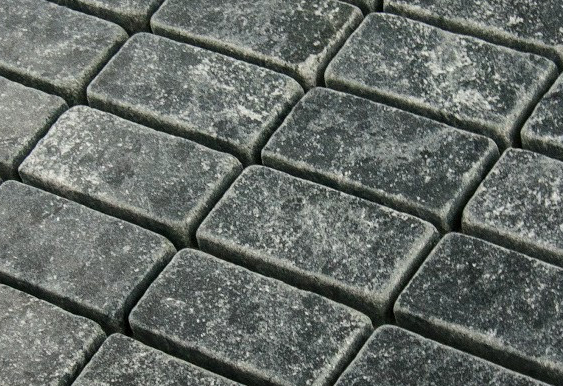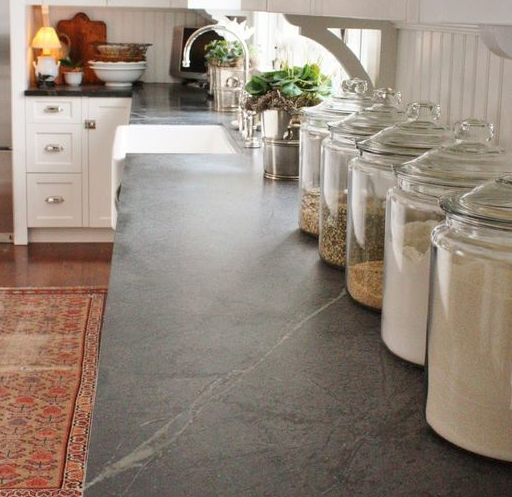Soapstone is the term commonly used to refer to the mineral steatite. Steatite is composed primarily of talc and magnesite with varying amounts of other minerals. The name, soapstone, originated from the stone’s soft, soapy texture, resulting from the high percentage of talc. Soapstone is grey, blue or green in color with veins of other colors, depending on the mineral composition.
The stone will turn a dark charcoal color with age or when treated with mineral oil. It is a relatively rare mineral, and the only significant deposits in the US exist in Virginia and Vermont. Most soapstone is obtained from Finland and Brazil and is usually quarried in 30 in. by 84 in. sections. It is frequently used in the construction of countertops, patios, pool copings, and outdoor tables. Soapstone sinks and bathtubs are also growing in popularity.
Let Texas Stone Sealers clean, seal, and restore your stone surface today!
Vulnerabilities of Soapstone
Low talc compositions of soapstone are quite durable and water resistant, making it a popular choice for indoor and outdoor applications. Soapstone’s nonporous structure inhibits the absorption of liquids and prevents staining. Since it is chemically inert, soapstone is impervious to acids such as lemon juice as well as alkalis found in household cleaners. Although resilient, soapstone is a soft material and easily scratched by sharp or abrasive objects.
Over time, the stone will wear and soften at the edges, accumulating nicks or dents. That is why sealing soapstone countertops, patios, pool copings, and outdoor kitchen/table surfaces is so important.
Patios constructed of soapstone are subjected to large amounts of foot traffic and abrasion, which can scratch the surface. As the material ages, the edges of the patio may soften and become easier to damage. Utensils, knives and dishware are frequently placed on outdoor table tops, leaving fine scrapes and scuff marks in the soapstone.
Soapstone is typically oiled or waxed to enhance its color. In some cases, the scratches may only be through the layer of oil or wax. Treating the surface with oil may be sufficient to remove the scratches. Surface scratches on soapstone can often be removed by sanding.
Soapstone countertops are vulnerable to a myriad of substances and activities that go in in the kitchen. Cutting on or dragging heavy objects across your soapstone countertops can cause damage, leaving behind scrapes and divots. It will need to be oiled often if not sealed.
The Benefits of Sealing Soapstone
Soapstone is naturally a grayish blue color. While some prefer to maintain the original color, soapstone will darken as it ages. More often, the soapstone is treated with oil to darken the color and accentuate its veining characteristics. Over time, the oil will evaporate. To maintain an even color, the oil must be re-applied every four to eight weeks.
Stone sealers can significantly reduce the amount of maintenance needed to sustain the desired color of the stone. Two types of sealer are available to provide the desired color. Those who prefer the natural color of soapstone can protect the stone from changing color with a clear sealant. A color enhancing sealant is available for those who prefer the darker color. The sealant will darken the stone as if it were oiled but only needs to be applied every three years.
Cleaning and Sealing Soapstone
Soapstone cleaning is not a complicated process; it can usually be cleaned with just soap and water. Cleaning soapstone is pretty straight-forward because of its non-porous, solid composition. Its non-porous nature makes it bacteria resistant, providing a naturally clean surface. Dirt and soil are easily swept from soapstone without vigorous scrubbing.
Therefore, practically any household cleaner can be used to clean soapstone. Unlike most natural stones, soapstone is not damaged by ammonia. While soapstone is durable and needs little maintenance, it requires frequent oiling, waxing or a sealant application to sustain a consistent, dark color.
Sealing soapstone is the best way to protect it long term, especially if it is outdoors. To preserve the color of your soapstone, it should be resealed every three or four years. The frequency may depend on the amount of stress the sealant is exposed to; however, scratches on the surface of the sealant usually only require application to the affected area. Texas Stone Sealers provides a four year warranty on matte finishes and a three year warranty on their glossy finish. If for any reason resealing is required during the warranty, we will reseal your soapstone patio or coping once at no cost.
Protect, Seal, and Clean Your Soapstone Today!
Let our soapstone sealing professionals preserve and enhance the color of your stone; we take the stress out of maintenance. Call Texas Stone Sealers today for a consultation with no obligation. We have teams ready to seal your stone or other hard surfaces in Houston, Austin, Dallas, Fort Worth, and San Antonio. Our friendly staff can be reached at 888-275-5354.




